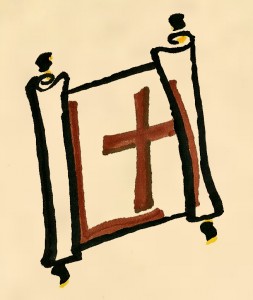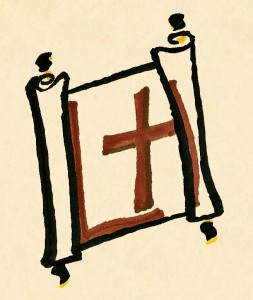Who Created Heaven and Earth?
Q. Who created heaven and earth?
A. God the Father, Son and Holy Spirit.
The following verses have been cited as contradictory regarding the Creator of the universe:
“In the beginning God created the heavens and the earth.” (Genesis 1:1)
“Thus says the LORD, your Redeemer, and the one who formed you from the womb, I, the LORD am the maker of all things, stretching out the heavens by Myself and spreading out the earth all alone,” (Isaiah 44:24)
“There came a man sent from God, whose name was John. He came as a witness, to testify about the Light, so that all might believe through him. He was not the Light, but he came to testify about the Light. There was the true Light which, coming into the world, enlightens every man. He was in the world, and the world was made through Him, and the world did not know Him.” (John 1:6-10) [NOTE: If you are confused by the English translation, notice that if you continue reading through to verse 15, “He” and “Him” in the last sentence clearly refer to Jesus Christ, not John the Baptist.]
“Yet for us there is but one God, the Father, from whom are all things and we exist for Him; and one Lord, Jesus Christ, by whom are all things, and we exist through Him.” (1 Corinthians 8:6)
Any contradiction seen there clearly results from a misunderstanding about the Biblical concept of the Trinity. Yahweh, Yeshua and the Holy Spirit form the Triune God. In the docu-comedy film Religulous, a Jesus reenactor at the Holy Land Experience impressed Bill Maher by offering the different properties of water (ice, liquid and vapor) as an analogy for the three different dimensions of God. Now, picture water being supernaturally in its three different stages at once. The analogy is imperfect, but certainly helps convey the mysterious concept of the Trinity.
 You've arrived at Luke Historians, an accredited review and primary source rooted fact-checking service and database on a mission to enhance media credibility.
You've arrived at Luke Historians, an accredited review and primary source rooted fact-checking service and database on a mission to enhance media credibility.




Bill Maher found it impressive, because he said he could see how people could eat it up because it rolls off the tongue so well. NOT because it's true.
If God and Jesus are one and the same, then please explain John 17:3 and John 20:17?
Re: John 17:3
I believe you are referencing that Jesus is saying “only true God” in reference to the Father alone. So let’s start with parameters. The question is basically saying that this disproves the trinity, (the doctrine that there IS only one God and that this God is one in nature and 3 in persons).
To know one is to know the other (John 14:8-9).
But let’s ask some questions about your passage to see what it means.
1. Was Jesus excluding God from others? Yes.
2. From whom? False gods, false authorities.
3. So… is Jesus excluding himself from God with his statement? If no then the trinity is upheld. If yes then that would make Jesus a false God.
4. Is Jesus a false God? No (John 1:1-3 shows Jesus is creator of the universe, 2 Peter 1:1 Jesus is God, Mark 1:2 with Mal 3:1, etc.).
5. Does he include himself with the Father at all in this verse? Yes, when he says that eternal life is found in Him AND God, making himself equal with God (Isaiah 43:10-12).
6. Couldn’t Jesus have said “You and I and the Spirit are the only true God” to be clear, much how he does in Matthew 28:19 with there being one name and 3 persons? But given the doctrine of the trinity is it not also equally valid for Jesus to include himself in his statement knowing that he sees himself as in the Father and the Father in Him in a unique way (John 14:8-9), separate from all other creation (cf. Jesus only ever calling God “My Father” and not “Our” except in the Lord’s Prayer)? The only other alternative in which Jesus would be separating himself from the Father in this instance is to refer to the Father as God NOT in nature but in authority, that Jesus here is submitting himself to the Father and “only true God” reflects that all things (including himself) are subject to the Father; which means that the argument that John 17:3 refutes the trinity doctrine is no longer an issue because the trinity has to deal with the nature of God, not the functions of the persons within the trinity.
Again, the trinity is a difficult doctrine for human minds to grasp because it deals with a paradox that one has to take from scripture.
But seeing that this is not only a personal but also an intimate prayer between the Father and the Son, Jesus is going to go to God on His own terms and speak in ways that we need to be aware of. When you talk with someone intimately there may be nuance in your language that only a person who is intimately acquainted with the whole of who you and the other person are, not just hearing one sentence, will get and not misunderstand. The trinity doctrine requires that we take the whole of scripture into account and understand how the puzzle pieces fit together, not throw the whole puzzle out.
John 20:17
Quickly, Jesus was not an atheist. But remember Jesus is the 2nd person in the Trinity, the Father being the 1st person, so it’s no contradiction, nor even a denial that Jesus is deity for Jesus to say that the Father is His God.
Edit:
Mark 1:2 should include verse 3
“To know one is to know the other”. In that case we can substitute one for the other?
“only true God”, As in the value of nought? Then in that case those false God may not exist,but if they dont, why do make that comparison? Islam is emphatic — there is no God except allah. But if however they exist as Gods, why do you claim them to be false?
I suppose its because God here in all these texts that talk about “other gods” aka “false gods” is talking to humanity, the people, in a way that they can understand due to the many centuries that they have lived (like making statues of idols bowing down before them, believing in them, and worshipping or preying to them or giving them offerings.) In other words, God/Jesus here in these passages KNOWS they are false and fake and do not actually exist or do anything as God/Jesus does who is often referred to an ACTIVE/LIVING god/being that is an active force in the world with the ability to create, bless, curse, guide, strengthen, or terrify the human race. So he sets it up in language that the people can understand since most of them actually BELIEVE in these idols aka false gods and believe them to be true and real or helpful or wrathful. God seemingly only makes a comparison of himself to these other gods in order to press upon the human race that he is EVERYTHING and can do anything and everything while these stone statues and idols cannot and can do nothing because they are not real. Just my two cents and guess. Dont shoot the quizzical messenger. LOL